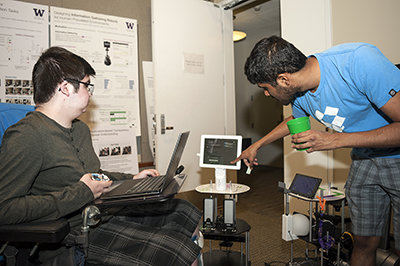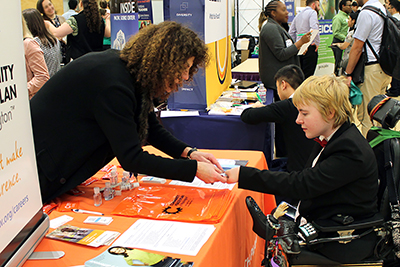Evaluation

Mentor Surveys
Surveys at the end of the project asked mentors about their overall mentoring experience, how they benefited from the project, and their perception of how students benefited from project offerings.
The following are responses from mentors who were asked about their overall experience:
“The mentoring experiences I have been involved in have very committed and interested students who want to learn more. Students and other mentors are passionate, and the other mentors absolutely want these students to succeed in their career—whether it’s an internship, first job, or in the middle of their career.”
“Excellent. It’s always good to see youth and job seekers with disabilities bringing up difficult and challenging issues and wanting answers to improve their knowledge and self-advocacy skills.”
“Meeting these students and interacting with them in person was a great experience. Offering my experience in the HR field I believe really helped these students prep for future interviews and resume prep. I was mentored during college and my first hand experience with being a student moving into the professional world with this mentorship behind me really helped! I believe this mentor opportunity at UW is preparing these kids with the same guidance I was given.”
The following are responses from mentors who were asked about how they benefited:
“By working one on one with students and even other mentors, it allows me to do my job better. To design better products, programs and to see who in my community is going to use and benefit from them. It's powerful. You can read all day long, but doing and experiencing holds the power.”
“I definitely benefited! Events like this help me in my professional career by helping me understand my own interview process and how it could improve.”
“Working in the disability field, the opportunity to have discussions with students on hot-button issues allows for me to see what disability barriers continue to be prevalent in the communities and in the employment sector.”
“This experience has exposed me to more and more students, and the variety of their backgrounds, interest, and skillsets helps me learn different ways to mentor. For example, I have a stronger background in accommodations and resources for mobility and visual impairments, but I have been exposed to many individuals with a variety of disabilities, so I am more able to speak to some of the resources for those disabilities.”
The following are responses from mentors who were asked about how students benefited:
“I am certain that these students all took something away from the mentoring opportunities. Many students have some idea of the accommodations they will need in the workforce and when to ask for them. Through our sessions on disability disclosure and self-identification, students are more aware of the many opportunities when working with a new or existing employer. I think these students have learned to speak with confidence about what they need, how it will help them succeed, and also how they will help their organization succeed.”
“The ability to reach out to a field of mentors when addressing a question has a greater impact, as it results in different perspectives, experiences and resources. This provides students with more informed choices to make better decisions on how to move forward and/or solve a problem.”
“My read is that students sharpen their skills in this process...and seem to enjoy meeting our members-several always follow-up for more info from us in order to be more current on their fields.”
“As an HR manager I have first hand knowledge with viewing resumes and doing interviews. I gave these students real techniques and tips to make it through interviews and help their resumes be a bit more efficient. It is the little things you can do sometime to help you get a second interview or even a first interview.”
“One (student) came to work with one of our teams and continues to spread the things he learned through the project. He's now a student and a mentor! That is success.”

STEM Student and Job Seeker Surveys
Surveys at the end of the project asked mentors about their involvement in the project. When asked about what was learned as a result of participation, the most common responses were related to making career decisions, finding internships/jobs, learning about resumes and interviews, and realizing that there are companies and individuals that are interested in hiring individuals with disabilities; this included the following comments:
“Increased ability to perform well during job interviews and advocate for myself.”
“Increased knowledge of technology and tools available to help me thrive in academic/workplace environments.”
“Just how many options there are in STEM fields and how vital they are to everybody.”
“The more interviews you do, the better you get. Practice!”
“When I get stuck, I should ask. There is a mentor out there that has already tackled my issues.”
“The career center is a great resource and they actually know how to work with people with disabilities.”
“(I learned) how to write resumes, elevator pitches, and other essential pieces of writing for job searching and related purposes.”
“Recruiters and companies want to see the best in diversity, and they are eager to learn more as well.”
“Editing resumes is not as difficult as it sounds!”
“Having a community that understands the challenges that you're going through is just as important as finding and getting a job that is a good fit.”
When asked about how participating in the project changed how participants felt about succeeding in STEM programs and STEM fields, the most common response was related to increased confidence in success. Specific comments included the following:
“After I graduated I felt like there just wasn't room for someone like me in STEM fields. As a person with a psychiatric disability I felt stigmatized... I felt as though I had been outcast due to the difficulties I have communicating about issues in which there is conflict. Being involved with AccessSTEM Careers has renewed my faith in my ability to overcome my disability and become productive in my field.”
“This project made me more inclined to succeed in college and pursue a STEM field of study. My participation in this project helped me see the potential that technology has for people with accessibility issues. I also got to meet plenty of nice people, understand their needs better, and get new ideas for how to help them. Furthermore, seeing these people pursue STEM fields of study helps encourage me to do the same.”
“Prior to AccessSTEM Careers, I never truly considered the importance of disclosing one's disability, and when it would be important and when it would not be important. The disability disclosure workshop has helped me educate my supervisors on the importance of reasonable accommodations and advocate for equal access at work. I now know when it is necessary to disclose my disability and at the same time not jeopardize my chances at securing a job.”
“Going to the internship and career fairs is less scary now that I have gone to a few, and while I still need to work on my networking pitches, I have improved in building self-confidence and knowing roughly what I would like to talk about, as well as strategies for making the best use of career fairs.”
“I got to network with other students, recent graduates, and employees… I was able to ask those people questions to answer my concerns about my future. It was very helpful because I was able to hear different perspectives from different people.”
“(I realized) there are others who came before me and that if they can succeed, I can.”
“I became more aware of what it takes to succeed in college and what I can do to ensure success for myself.”